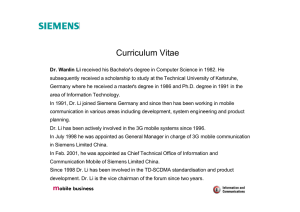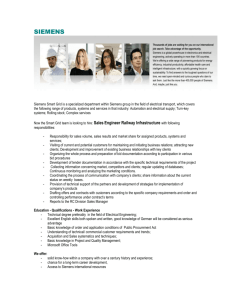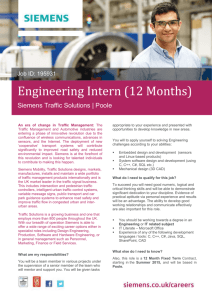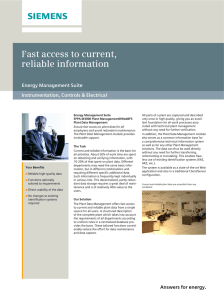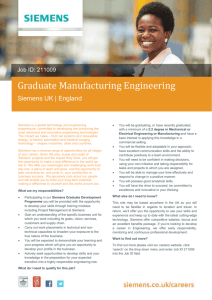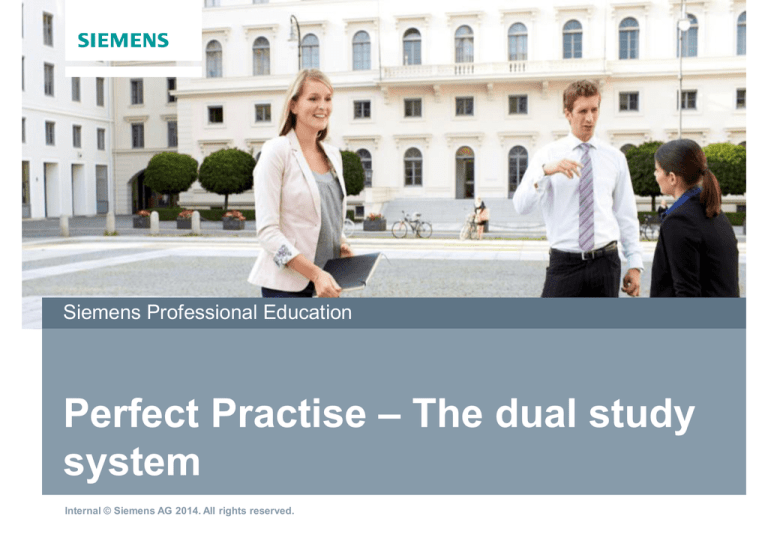
Siemens Professional Education
Perfect Practise – The dual study
system
Internal © Siemens AG 2014. All rights reserved.
Who we are – Siemens Professional Education and its partners
Excursion – Schooling and the dual training system
What we do – A corporate view on the dual study system
Why we do it – the future of vocational education
Internal © Siemens AG 2013. All rights reserved.
Page 2
03/2014
Christian Hoffelder M.A. / HR STD LE SPE BO NBY BEDU
Where we are - Siemens offers vocational training all
over Germany
North
Hamburg
Bremen
Berlin
Hanover
North East
Braunschweig
Bocholt
West
Duisburg
Krefeld
Paderborn
Essen
Mülheim
Düsseldorf
Bad Hersfeld
Marburg
Erfurt
Görlitz
Leipzig
Waltershausen
Rudolstadt Chemnitz
Frankfurt/M.
East
Bad Neustadt/ Saale
Middle
Northern Bavaria
Kemnath
Erlangen
Nuremberg
Saarbrücken
Amberg
Karlsruhe
Regensburg
Stuttgart
Tübingen Kirchheim/T.
Eichstätt
Herbrechtingen Ruhstorf
Willstätt
Augsburg
Munich
Freiburg
Konstanz
Frankenthal
South West
Southern Bavaria
As at March 2014
Internal © Siemens AG 2013. All rights reserved.
Page 3
03/2014
Christian Hoffelder M.A. / HR STD LE SPE BO NBY BEDU
Who we are - SPE is a central department
of Human Resources
Managing Board
Sectors
Energy
Healthcare
Corporate units
Industry
Infrastructure & Cities
Corporate
Development
Management
Consulting Personnel
Cross-Sector
Services
Cross-sector
Businesses
Separate
Business
Finance
and Controlling
Communications & Gov. Affairs
Global Shared Services
Financial Services
Osram
GSS
SFS
OSR
Legal
and Compliance
Information
Technology
Siemens Real Estate
Corporate
SRE
Technology
top+ &
Quality Management
Corporate Supply
Chain Management
Data Protection
Siemens Management
Consulting
SMC
Regional Clusters
Siemens Deutschland (GER),
Regionalgesellschaften, Repräsentanzen, Vertretungen
Human Resources
Siemens Professional
Education
Corporate
Security Office
Corporate Sustainability Office
SPE
Internal © Siemens AG 2013. All rights reserved.
Page 4
03/2014
Christian Hoffelder M.A. / HR STD LE SPE BO NBY BEDU
Excursion: The historical developement
of the dual training system in Germany
Introduction of vocational training was
formed in the 1870’s in recourse to medieval guild
training system with its three step curriculum
(apprentice, journeyman, master)
Crafts and vocational training was redesigned to fit
the industry’s need for skilled workers
In 1920 first “modern” vocational schools were
introduced to increase the school graduates fitness
for the job
In 1969, the modern dual system started with the
act on vocational training (BBiG), harmonizing the
various different training and school systems in
Germany
Internal © Siemens AG 2013. All rights reserved.
Page 5
03/2014
Christian Hoffelder M.A. / HR STD LE SPE BO NBY BEDU
Excursion: The historical developement
of the dual training system in Germany
Dual education laid down by law
(act governing vocational training, apprenticeship
regulations, curriculums)
Defined occupations requiring formal training
(e.g. Industrial Business Management Assistant,
Electronics Engineer, Qualified IT Specialist)
Duration of apprenticeship: 2 - 4 years
(may be shortened by 6 months under certain
circumstances)
Apprentice and company conclude an
apprenticeship contract
(school leavers apply to company)
Examinations: intermediate and final examinations
(theory and practice) are centrally set and organized
by the Chambers of Industry and Commerce
Internal © Siemens AG 2013. All rights reserved.
Page 6
03/2014
Christian Hoffelder M.A. / HR STD LE SPE BO NBY BEDU
Excursion - There are various paths of education in
Germany, all of which can lead to the highest
qualification
Univ. of Applied
Sciences
Vocational academic
secondary school
(Berufsoberschule / BOS)
Dual degree
program
University
Specialized acad.
secondary school
(Fachoberschule / FOS)
Vocational training
Vocational training
Lower intermediate
leaving certificate
(Qualifizierender
Hauptschulabschluss)
Upper intermediate
leaving certificate
(Mittlerer
Bildungsabschluss)
Vocational
training
General university
entrance qualification
(Allgemeine
Hochschulreife)
Primary school
Nursery school (Optional)
(Illustration based on the example of the Free State of Bavaria)
Internal © Siemens AG 2013. All rights reserved.
Page 7
03/2014
Christian Hoffelder M.A. / HR STD LE SPE BO NBY BEDU
What we do - Dual degree programs are conducted at an
institution of higher education with practical periods at
the company
Degree course
Double qualification
for young people
Theory in cooperation with
30 institutions of higher
education and universities
Siemens
Practical periods in
Germany and abroad
Theory
+
Practice
+
International
experience
Duration 3 – 4 years
Internal © Siemens AG 2013. All rights reserved.
Page 8
03/2014
Christian Hoffelder M.A. / HR STD LE SPE BO NBY BEDU
What we do - Examples of our dual curicula
Apprenticeships and degree programs requiring university entrance
qualification
Electrical
Engineering/
Mechatronics
Information
Technology
Bachelor of Engineering. in
Electrical Engineering and
Information Technology
incl./excl. vocational qualifications
awarded by the Chamber of
Industry and Commerce
Bachelor of Engineering. in
Information Technology
Bachelor of Engineering in
Electrical Engineering
Bachelor of Science in Computer
Science
Bachelor of Engineering in
Mechatronics incl./excl. vocational
qualifications awarded by the
Chamber of Industry and Commerce
Bachelor of Science in IT
Engineering and Business
Consulting incl. vocational
qualifications awarded by the
Chamber of Industry and
Commerce
Bachelor of Science in Electrical
Engineering and Vocational Training
incl. vocational qualifications
awarded by the Chamber of Industry
and Commerce
Bachelor of Engineering in
Industrial Engineering
Industrial Technologist
Automation
Mechatronic Systems
Bachelor of Arts in Business
Administration incl.
Specialist Consulting
Specialist Consultant in
Software Engineering
Integrated Systems
Sales
Mechanics/
Mechanical
Engineering
Business
Management
Bachelor of Engineering in
Mechanical Engineering
incl./excl. vocational
qualifications awarded by the
Chamber of Industry and
Commerce
Bachelor of Arts in Business
Administration
incl./excl. vocational
qualifications awarded by the
Chamber of Industry and
Commerce
Industrial Technologies
in Mechanical Engineering/
Power Engineering
Bachelor of Arts in International
Management
incl. vocational qualifications
awarded by the Chamber of
Industry and Commerce
Master of Engineering in
Power Systems Engineering
incl. Bachelor of Engineering +
vocational qualifications
awarded by the Chamber of
Industry and Commerce
Bachelor of Arts in Business
Administration Industry/
Service Management
Bachelor of Science in
Business
Information Technology
Bachelor of Arts in
Management with Engineering
Office Management
Assistant (2-year)
Internal © Siemens AG 2013. All rights reserved.
Page 9
03/2014
Christian Hoffelder M.A. / HR STD LE SPE BO NBY BEDU
What we do - most apprentices and students were
hired permanently after they completed their
education
Apprentices / trainees qualified at Siemens Germany (FY2013)
1,818 qualified
502
(27,6%)
Taken into
employment
Disposals
There are many reasons
why people leave
Siemens after completing
their vocational training:
To aspire to a higher
educational qualification
1,316
(72,4%)
To go on to higher
education (degree
course)
Taken into
employment
permanent
863
(66%)
453
(34%)
temporary
To work outside the
company
Personal reasons
Internal © Siemens AG 2013. All rights reserved.
Page 10
03/2014
Christian Hoffelder M.A. / HR STD LE SPE BO NBY BEDU
What we do - Siemens is one of the largest trainers in
Germany
Training costs Germany: 184' € p. a.
2,140 hirings in 2013
Commercial
trainees
440
21%
of these doing
dual courses
1.507
70%
(596)
Technical
trainees
Numbers at the
Siemens
Technical
Academies
of these doing
dual courses
-106 women
Numbers: 6,957
Technical
occupations
5375
of these 589
are women
Commercial
occupations
1,195
of these 707
are women
387
Siemens Technical
of these 54
Academies
are women
Trainees via
corporate
associations
90
External Trainees
2,814
Internal © Siemens AG 2013. All rights reserved.
Page 11
03/2014
Christian Hoffelder M.A. / HR STD LE SPE BO NBY BEDU
Why we do it – Why we have to do it!
The education market will become an
applicant market
The number of school graduates will go down
until 2020 and competition for best fit
applicants will increase.
There will be a low number of applicants
vs. a large number of open jobs
(esp. in technical dual courses).
A growing number of companies will offer
dual courses.
Internal © Siemens AG 2013. All rights reserved.
Page 12
03/2014
Christian Hoffelder M.A. / HR STD LE SPE BO NBY BEDU
Why we do it – Our benefits
Training founded in reality
• Learning on the job
• Insight into their future work environment
• Social qualifications
Career ready employees
• Little to no transaction costs
• No special trainee program required
• Ready for the job after graduation
Internal © Siemens AG 2013. All rights reserved.
Page 13
03/2014
Christian Hoffelder M.A. / HR STD LE SPE BO NBY BEDU
Contact
Christian Hoffelder M.A.
Head of Business Education,
Northern Bavaria
HR STD LE SPE BO NBY BEDU
Von-der-Tann-Str. 30
90439 Nuremberg
Tel.: +49 (911) 654-3230
Mobile: +49 (172) 2789851
E-Mail: christian.hoffelder@siemens.com
Siemens.de/ausbildung
/StarteDeinSiemens
/Siemens
/Siemens
Internal © Siemens AG 2013. All rights reserved.
Page 14
03/2014
Christian Hoffelder M.A. / HR STD LE SPE BO NBY BEDU

